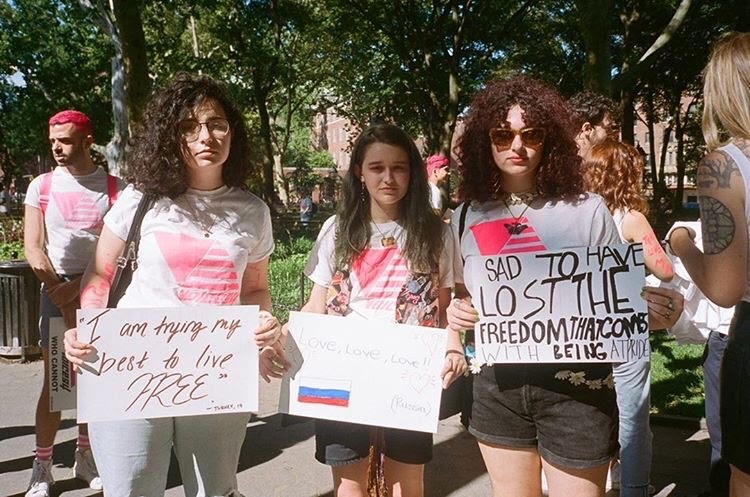Supreme Court Decision Marks Important Moment in Queer American History
Edie Fine ’21, News Reporter, stands with fellow members of an organization called Voices4, which is a queer advocacy network that focused their activism efforts on fighting for queer justice when the three Supreme Court cases were being argued on October 8, 2019.
On June 15, 2020, the Supreme Court ruled a historic decision in the narrative of LGBTQ+ history in America. They ruled that Title VII under the Civil Rights Act of 1964, which ensures “equal employment opportunities… without discrimination because of race, color, religion, sex or national origin,” protects queer and transgender employees.
The leading case, argued back in October of 2019, was accompanied by two others in a triptych of cases that put Title VII underneath the judicial microscope. In the case (R.G. & G.R. Harris Funeral Homes Inc. v. Equal Employment Opportunity Commission and Stephens), Aimee Stephens (she/her), a transgender woman, was suing her place of work for having unjustly fired her after coming out. In this historic case, transgender attorney Chase Strangio (he/him) represented Stephens, noting that their case would mark the first time the word “transgender” had been uttered in a case argued within the Supreme Court halls. Aimee Stephens passed away on May 12, 2020, but her legacy will be immortal. The two others (Bostock v. Clayton County, Georgia and Altitude Express, Inc. v. Zarda) regarded gay men who were fired for their sexual orientations.
Justice Neil Gorsuch, a justice appointed during Trump’s presidency, wrote the majority decision, saying “Today, we must decide whether an employer can fire someone simply for being homosexual or transgender. The answer is clear.” He was joined by 5 of the other 8 justices, including the court’s liberal justices and Chief Justice John Roberts. “It is impossible to discriminate against a person for being homosexual or transgender without discriminating … based on sex,” Gorsuch argued. Strangio has deepened this logic by providing the example of himself. “If you fire me because I have a male gender identity,” he said, “you would not fire someone assigned male at birth for that. You would only fire someone assigned female at birth for that.” Gender identity and sexual orientation are inextricably linked with sex; they cannot be isolated from each other. This concept is now legally recognized.
Justice Gorsuch summed up the winning logic in a concise 33 pages. The dissents, however, took up 135 pages. Justices and non-justices alike have long used the ambiguity of the law’s language as a disguise for blatant transphobia and queerphobia. In a recorded video for the ACLU, Strangio noted that “the Trump administration has hinged every bit of anti-trans discrimination, mostly, but anti-LGBTQ discrimination [in general] on interpretations of ‘sex’ under federal law.” Bigots weaponize the language to pursue anti-trans and anti-LGBTQ+ agendas. “Title VII of the Civil Rights Act of 1964 prohibits employment discrimination on any of five specified grounds: ‘race, color, religion, sex and national origin,’” said dissenting Justice Alito. “Neither ‘sexual orientation’ nor ‘gender identity’ appears on that list.”
The Trump administration had vocally sided with the dissent on this case, and of the decision, President Trump said, “they’ve ruled and we live with their decision.” From the start of the orations argued on October 8, 2019, the Trump administration was attempting to sway the decision towards the dissent. The Trump Administration’s Department of Justice filed a brief in U.S. Supreme Court that argued current federal law does not bar discrimination against transgender and gay individuals.
Regardless of bigoted ideas of what and who the law protects, the Supreme Court decision is a victory for the LGBTQ+ community — and one with long-lasting implications. The decision sets a precedent that LGBTQ+ protections are innate and fundamental to the wellbeing of the country. This Pride month, marked by this victory, is especially historic.
The Supreme Court decision is a victory for the LGBTQ+ community — and one with long-lasting implications.
Edie Fine (she/they), an Editor-in-Chief for ‘The Science Survey,’ is thrilled to be on the journalism staff for a second year. She loves telling stories,...











